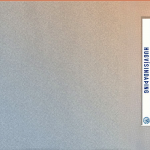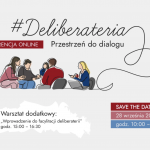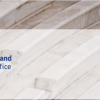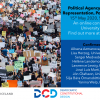Home » Articles posted by Sævar Finnbogason
Author Archives: Sævar Finnbogason
DCD workshop at the Conference of the Humanities

DCD participates in the 2022 Conference of the Humanities hosted by the University of Iceland with a panel called DELIBERATION, PARTICIPATION, INCLUSION: KEY ISSUES OF DEMOCRACY.
The panel focuses on the concept of democracy from two different directions. On the one hand we discuss the necessary conditions of democracy, on the other democratic legitimacy. Three strands of democracy will figure most clearly in the talks: Deliberation, participation and inclusion. The idea of deliberative democracy has transformed democratic theory in the last three to four decades. In deliberative democracy the quality and transparency of democratic authority depends on its deliberative qualities where the engagement of citizens in monitoring and discussing policy- and decision-making is of primary importance. Civic participation has become a more prominent topic of democratic theory more recently which to some extent reflects dwindling trust in democratic institutions, doubts about democratic representation and a demand for greater civic control of public decision-making. But participation does not guarantee inclusion and even where robust participatory processes are in place minorities and marginal groups may still not enjoy full political access. Speakers explore how deliberation, participation and inclusion figure in both outlining necessary conditions of democracy and ensuring democratic legitimacy. Deliberation e.g. does not provide safeguards against special interest or guarantee the quality of decsions. Participatory processes may undermine democratic accountability and lead to doubts about the legitimacy of decisions-making.
Panel program
kl. 13.00-14.30 room 311 Árnagarði
Jón Ólafsson: Deliberation: Quality vs. Diversity as a measure of democracy
Sævar Finnbogason: From Technocracy to Technopopulism
Milica Minic: Meaningful Participation as a Site of (Productive) Tension: Citizen Engagement and Democratic Accountability
15.00-16.30 room 311 í Árnagarði
Jeremias Schledorn: What you Represent: The Politics of Representation and the Moral Problem of Redescription
Katrín Oddsdóttir: Democratic Constitutionalism and the Icelandic Constitutional Process
Valgerður Björk Pálsdóttir: When deliberative events are disregarded in the political decision-making process: Motivations, attitudes and actions of elected representatives in Iceland
Visit the conference website for abstracts and full conference program.
DCD participates in ‘Deliberateria – a space for dialogue’
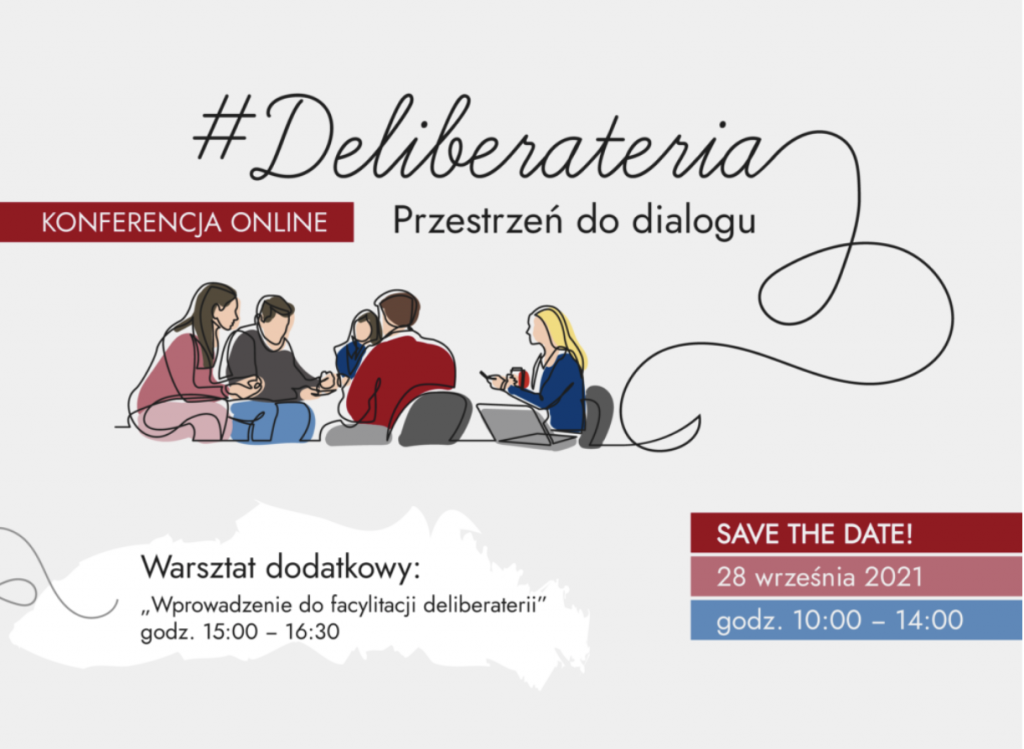
Jón Ólafsson and Salvör Nordal will participate in the online conference Deliberateria – a space for dialogue organized, by the Polish Institute for Human Rights and Business (PIHRB), the DCD and the University of Iceland, which will take place online (zoom platform) on September 28, 2021 at 10.00 – 14.00. The simultaneous translation will be provided (PL-EN- PL).
#deliberateria – a new form of dialogue, or even more broadly – civic engagement, will be presented. It has been developed as a part of “Human rights and business – social dialogue post-COVID19” project, carried out with support from the Active Citizens – National Fund program, financed from EEA Funds. Participants of the conference will also have the opportunity also to experience Deliberataria in practice thanks to mini-deliberateria session integrated into the program of the event.
The project is influenced and inspired by the Icelandic constitutional process and the online pilot meetings with residents of three cities in cooperation with the local governments of Poznań, Przemyśl and Częstochowa, to an e-publication collecting the most important conclusions from the project.
The conference program is available here and further information and registration on the events Facebook page
Video from the online workshop on Open Democracy and New Democratic Institutions
The recording from the online workshop on Open Democracy and New Democratic Institutions is now available via youtube. After a short introduction by Oddur Þorri Viðarsson from the Prime Ministers office The speakers were (in this order) Hélène Landemore, Jón Ólafsson, Salvör Nordal, Alexander Hudson and Claudia Chwalisz from the OECD, who presented the findings of the recent OECD report Innovative Citizen Participation and New Democratic Institutions: Catching the Deliberative Wave.
The findings of the report can be found here
Landemore’s new book Open Democracy: Reinventing popular rule for the 21st Century here.
Online Workshop: Open democracy and new democratic institutions
4 DECEMBER 2020, 13.00-16.00 (GMT)/14.00-17.00 (CET)

Exciting innovations in democratic theory and practice are taking shape amidst widespread concerns about the strength of democratic systems in a world destabilized by financial and economic uncertainties, deep political divisions and unprecedented disruption of daily life on a global scale.
In the next few years, democratic innovations may transform the standard conception of democracy as driven by elected representatives supported by professionalized public administrations. Citizens will increasingly demand and expect inclusion in policy making at all stages: in shaping and expressing the values and goals of democratic society; in identifying and selecting policy options; in deliberating public choices; and in making final decisions about long-term and short-term policies.
The workshop begins with a discussion of Hélène Landemore‘s new book Open Democracy: Reinventing popular rule for the 21st Century – a study of democracy which proposes an institutional paradigm of popular rule that is primarily non-electoral yet promises to be more democratically representative than any currently existing regime form. The author‘s talk is followed by commentaries by Salvör Nordal, Jón Ólafsson and Alex Hudson, who focus on the general argument of the book but also more specifically on the discussion offered of the Icelandic Constitutional Council and its meaning for democratic innovations.
The second half of the workshops expands the discussion of the implications of Hélène Landemore‘s book to a recently published report by the OECD, Innovative Citizen Participation and New Democratic Institutions: Catching the Deliberative Wave. Claudia Chwalisz from the Open Government Unit will talk about the report, which documents how deliberative processes work across different countries, identifies common principles and good practices that may be of useful guidance to policy makers seeking to develop and implement such processes, and discusses different options for institutionalising citizen deliberation.
Registration free and open to all: https://www.eventbrite.co.uk/e/open-democracy-and-new-democratic-institutions-tickets-130395353011
Workshop Program:
13.00-13.05 Welcome and introduction
Oddur Þorri Viðarsson, Legal Adviser at the Department of Legislative Affairs,Iceland’s Prime Minister’s Office
13.05-13.35 New book – Open Democracy: Reinventing Popular Rule for the 21st Century
Hélène Landemore, Tenured Associate Professor of Political Science at Yale University
13.35-14.00 Panel discussion: reflections on the book
Jón Ólafsson, Professor of Comparative Cultural Studies and Russian and East-European Studies at University of Iceland
Salvör Nordal, Director of Centre for Ethics at the University of Iceland
Alexander Hudson, postdoctoral research fellow at the Max Planck Institute for the Study of Religious and Ethnic Diversity
Q&A
14:20-14:45 Break
14:45-15:15 Detailed presentation of Catching the Deliberative Wave report findings
Claudia Chwalisz. Co-author of the OECD report, leading work on innovative citizen participation at the OECD
15:15-15:40 Panel discussion
Claudia Chwalisz, Hélène Landemore, Jón Ólafsson, Salvör Nordal, Alexander Hudson
15:40-16:00 Q&A
16:00 Conclution
For further information: https://www.oecd.org/gov/open-government/open-democracy-and-new-democratic-institutions-workshop-iceland-2020.htm
Has Covid-19 changed the terrain of engagement?

Liam O’Farrell considers the effects of Covid-19 on civic engagement: Will the pandemic make authorities more interested in digital public consultation?
Given that Covid-19 has only recently become part of our lives, there has not yet been a systematic review of how organisations and governments have changed their approaches to engaging with the public in response to the pandemic. This also reflects the uncertainty of knowing when things will return to normal, or how working and living habits will look afterwards. However, there is anecdotal evidence that organisations are becoming more interested in digital methods as a means of engaging the public in a socially distanced way.
We now stand at a crossroads. Civic engagement, devolution of power, and deliberative democracy are tools that we know can work to rebuild the legitimacy of political institutions that have been much undermined in many Western democracies. Handling the pandemic means requiring citizens to trust in the information that they receive from officials, and also for governments to use impartial, reliable figures and evidence-based advice. This is an opportunity to reset the moves towards ‘fake news’ that have been much documented in recent years.
Although it may seem counter-intuitive, Covid-19 presents a good opportunity for developing civic engagement strategies. Firstly, organisations have a chance to pause, reflect on established practices, and think critically about what needs to change. Secondly, there has been a tremendous flourishing of communal trust and interconnectedness. This moment of focus on social solidarity is an ideal period to attempt to reconnect the public with public institutions, and to also think about how power and resources are distributed in our societies.
Research in China has shown that, in the context of Covid-19, governments can use social media for citizen engagement that positively affects trust through dialogue and sharing of the latest information. Contrary to conventional views of Chinese social media as being sites of self-censorship and surveillance, the latest research has found that citizens have used the platforms for active engagement, including claim-making and negotiation with authorities. In the Western context, where free speech is seen as a fundamental right, individuals may feel able to be more critical of government information than the average user of a Chinese social media platform. There is a dark side, however, with individuals able to make false claims and the potential for hostile powers to undermine electoral processes with disinformation.
The pandemic has shown the importance of channels of communication between citizens and authorities, and the extent to which a functioning society relies on neglected values such as solidarity. In order to successfully overcome the pandemic, there needs to be a mutual relationship of trust between citizens and authorities. Civic engagement can achieve this, helping to develop holistic policy interventions and collaboratively identify needs and solutions. Covid-19 also provides the opportunity to introduce new, more unifying political narratives and rebuild trust through the use of credible, nonpartisan knowledge, along with the centring of experts over vocal populists who rely on emotion rather than facts.
Another important recent change with important political effects has been the renewed focus on the structural inequalities facing black people as a result of the Black Lives Matter protests. This is an opportunity for local and national governments, as well as agencies and organisations outside of government, to work alongside communities to tackle the ongoing discrimination that ethnic minority citizens face and work in partnership to develop an inclusive vision for the future.
Engaging with the issue of inclusion is one of the key areas of debate in contemporary civic engagement literature and research: namely, how far and by what mechanisms can we ensure a diverse range of views are represented in decision-making? For example, research on digital democracy has found that marginalised groups (e.g. ethnic minorities) continue to struggle to make their voices heard, or even contribute at all, in digital engagement spaces. Issues that women care about receive less attention in participatory budgeting processes than those championed by male participants, leading to calls for feminist principles of participatory budgeting to be developed. Similar problems are found in urban planning, where spaces are designed by the largely male practitioners of this field without consideration of how differently men and women experience space. The result is that women can feel unsafe using the spaces in our cities.
A further issue is the notion of cognitive diversity, an emerging and contentious area of research in this field. The question remains on the extent to which the views of those who think differently – from left-wing anarchists to far-right nationalists – can and should be incorporated into civic engagement and contingent structures of democratic deliberation. Indeed, is there a need for such ‘cognitive diversity’ at all, or does this undermine efforts to draw attention to the voices of groups that experience discrimination? Moreover, what limits can reasonably be placed upon speech and public discourse in such forums, if any at all?
This short article is an excerpt from Liam’s new report for the DCD: States of participation: international best practice in civic engagement. Download it by clicking here.
The Icelandic DCD podcast speaks to participants in the Deliberative meeting.
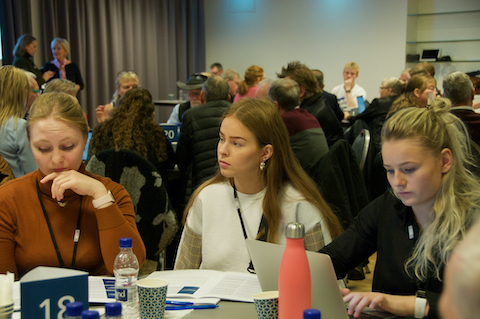
Who is ready to sit for a whole weekend to with 230 strangers and discuss amendments to the constitution?
The Icelandic speaking branch of the DCD podcast has now released a new podcast series where Sævar Finnbogason interviews participants in the deliberative meeting on the constitution, held 8 to 9th November 2019. We wanted to know why they agree to participate? How did they enjoy the discussions and were the happy with the answers the experts gave to their questions? What are their expectations about the influence the findings of the meeting will have? And how will the fate of the results from this meeting effects their willingness to take part in participatory democracy in the future?
Conference videos — Political Agency after Covid-19
The Political Agency after Covid-19 online conference was held on 15. May 2020 as the world is facing a pandemic that requires not only global effort but presents a trial of political leadership for governments around world.
Each talk is around 40 minutes, including comments and discussion and they are listed here according to order they were presented at the conference, starting with Opening remarks by the Prime minister of Iceland, Katrín Jakobsdóttir.
Political Agency after Covid-19
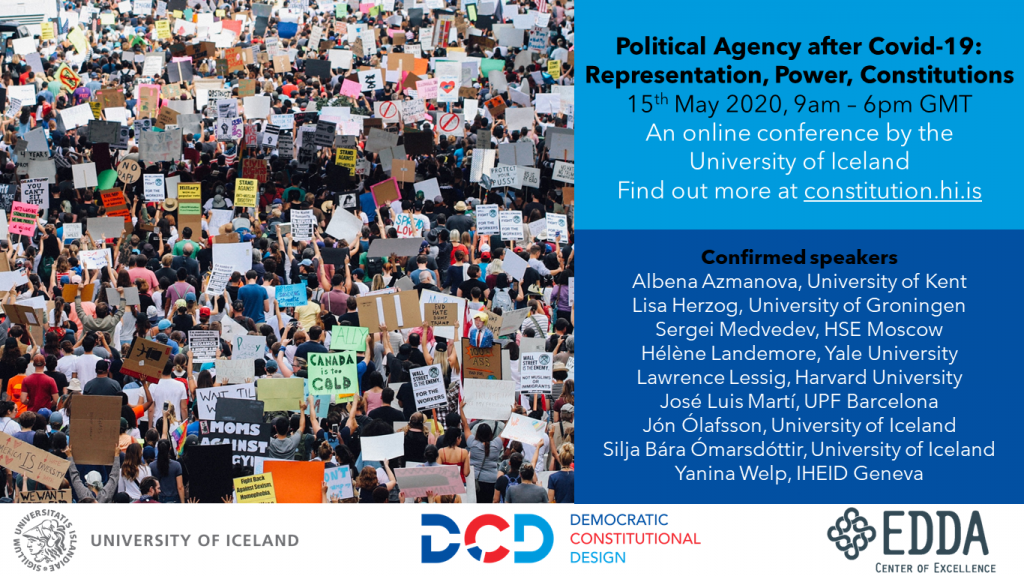
Political Agency after COVID-19: Representation, Power, Constitutions.
15 May 2020 9 am – 6 pm GMT
An online conference mediated by the University of Iceland, EDDA Research Center.
If you have problems with the registration form, please email the conference administrator Þórhildur Heimisdóttir on thorhildurheimis@gmail.com
Conference Program
09:00-09:10 Opening remarks by Katrín Jakobsdóttir, Prime Minister of Iceland
09:10-10:30 Session 1
09:10-09:50
Albena Azmanova, University of Kent
“Battlegrounds of justice — what really grieves the 99%”
Abstract: Before the pandemic, progressive forces were mobilising under the banner of fighting inequality. The pandemic, however, has revealed that the scourge of our societies is the generalised precarity — the massive economic and social fragility that four decades of cuts to public spending created. What policies are necessary for a swift change of direction?
Commentator: Bakar Berekashvili, Georgian American University
09:50-10:30
José Luis Marti, Pompeu Fabra University
“Collective Intelligence in Times of Crisis: Crowdcourced emergency decision-making against the Expertocracy Temptation”
Abstract: One of the temptations that many governments face in situations of emergency is a well-intentioned turn towards expertocracy, under the assumption that normal democratic politics and ordinary citizens are not able to deliver good and correct decisions. For many, democracy in general, in participatory democracy in particular, should be partially suspended or limited during crises like this. But this is very wrong. Evidence from previous emergency situations show how crowdsourced mechanisms of emergency decision-making, under the rights circumstances, may be the best way to improve the quality of decision making, as much as it’s legitimacy. I’ll revise different ways in which collective intelligence may be of great help in times of crisis like this.
Commentator: Eyja Margrét Brynjarsdóttir, University of Iceland
10:45 – 12:05 Session 2
10:45-11:25
Lisa Herzog, University of Groningen
Presentation on trust in science and democratic policy-making
Abstract: One thing that the Corona crisis has made very visible is our dependence on scientists – the press conferences of virologists and epidemiologists have become a daily ritual in many countries. I would argue, however, that structurally speaking, such a dependence on scientists and other experts has existed long before, and that it should be understood as a relationship of trust, rather than mere reliability. I discuss whether and how this dependence can be squared with democratic principles, drawing on Albert Dzur’s work on “democratic professionalism”. I conclude by briefly reflecting on implications for democratic practices such as minipublics or other participatory formats.
Commentator: Arne Hintz, Cardiff University
11:25-12:05
Jón Ólafsson, University of Iceland
“An epistocratic interregnum: The attraction of leaving decisions to specialists.”
Abstract: The prominence of health officials in managing the pandemic has for the most part been a relief to a distrusting public. The specialists are seen as objective and responsible, able to limit recommendations and decisions to what is necessary. Will this experience of a brief period where policies are actually determined by best knowledge make the public more open to a larger specialist role in government? Would that be desirable?
Commentator: Zhar Zardykhan, KIMEP University Almaty
12:40-14:00 Session 3
12:40-13:20
Silja Bára Ómarsdóttir, University of Iceland
“Pandemics and perceptions: ontological security in Iceland”
Abstract: in a 2016 study in Iceland, participants in a survey were asked to identify the main threats they perceived to their own security and that of the state. The focus was by and large on natural and environmental threats, as well as economic stability. Fear of pandemics threatening national security was minimal, but somewhat higher when it came to threats to personal security. In this talk, I ask whether the perception of security, the feeling of being safe, is more important than the state’s ability to provide security.
Commentator: Just Serrano Zamora, University of Groningen
13:20-14:00
Sergei Medvedev, Higher School of Economics, Moscow
“The return of nature: eco- and biopolitics of the pandemic”
Abstract:The current crisis has suddenly revealed the critical role of Nature in our civilization, bringing us back to “bare life”, the biological core of our existence, and placing biopower at the core of the emerging political order. In its origins, the pandemic is rooted in the broken interface between the Human and Nature — so the remedy might be found in reparing this relationship. The exit from the crisis might as well be green, and Nature might be awarded a stronger political agency.
Commentator: Nanna Hlín Halldórsdóttir, University of Iceland
14:15-15:35 Session 4
14:15-14:55
Lawrence Lessig, Harvard University
Democracy in the context of the Covid-19 crisis
Commentator: Viktor Orri Valgarðsson, Durham University
14:55-15:35
Yanina Welp, Geneva Graduate Institute of International and Development Studies
“Loyalty, voice or exit? Reflections from the Latin American experience”
Abstract: several surveys have described a global democratic decline. How will the pandemic affect it in Latin America? The region is characterized by a cyclical economical crisis, weak health systems and presidential regimes in which the executive popularity conditions the stability of the government. Will the crisis create opportunities for increased critical public engagement and possibilities for more participatory and inclusive political agency or will lead to more citizen’s disengagement and power concentration in the executive?
Commentator: Hólmfríður Garðarsdóttir, University of Iceland
15:50-18:00 Session 5
15:50-16:30
Hélène Landemore, Yale University
“Democracy in the Time of Cholera”
Commentator: Brendan Hogan, New York University
16:45-18:00
Roundtable moderated by Jón Ólafsson
Participants to be announced
Conference topic
Governments around the world are facing a pandemic that requires not only global effort but presents a trial of political leadership. Different reactions to the crisis will play out in different ways and have different consequences. In some countries initial reluctance to act by trivializing the threat has undermined political leaders; in other countries, politicians have surprised voters with resourcefulness and principled decision-making. Public health officials have emerged as a major force behind policy decisions and sometimes even dictated social measures affecting most citizens in their societies.
Globally, the pandemic is bound to have destructive economic consequences whose depth and extent will only become clear with time. Elected officials will survive only if they are able to maintain a public perception of their efficiency and trustworthiness – or if they succeed in pinning blame on their political opponents or other domestic or foreign scapegoats.
Will the coming political upheavals be played out in elite power struggles where political leaders desperately try to retain – or gain – public support? Will the situation have deeper, longer lasting systemic consequences, affecting both national and global governance? One of the most intriguing questions is whether the crisis creates opportunities for increased critical public engagement and possibilities for more participatory and inclusive political agency. Will it make clearer the need for foundational documents – such as constitutions – to be co-written and co-designed? Will the crisis affect dominating values and norms by increasing public appetite for collective social action, such as comprehensive public health policies, and by making individual liberty less central in political rhetoric?
The final and most fateful question is whether the pandemic will mark one more step toward governments’ openly embracing techniques of power that enable large scale surveillance of populations. Then we might be looking at intervention based on the most intimate details about citizens personal lives of, for the sake of collective security and public health.
Will the pandemic increase the understanding of the need for strong public policies to fight climate change? Is it going to create an interest in revising some of the more fundamental ideas of liberal democratic societies expressed in constitutions? Or is its presence one more state of exception, which will be normalized and instrumentalized and which will make an ideal of democracy yet more distant?
Deliberative mini-publics facilitating voter knowledge and judgement: Experience from a Finnish local referendum
Maija Setälä, Turku University
Veröld, Auditorium 023, Thursday 12 March, 12:05
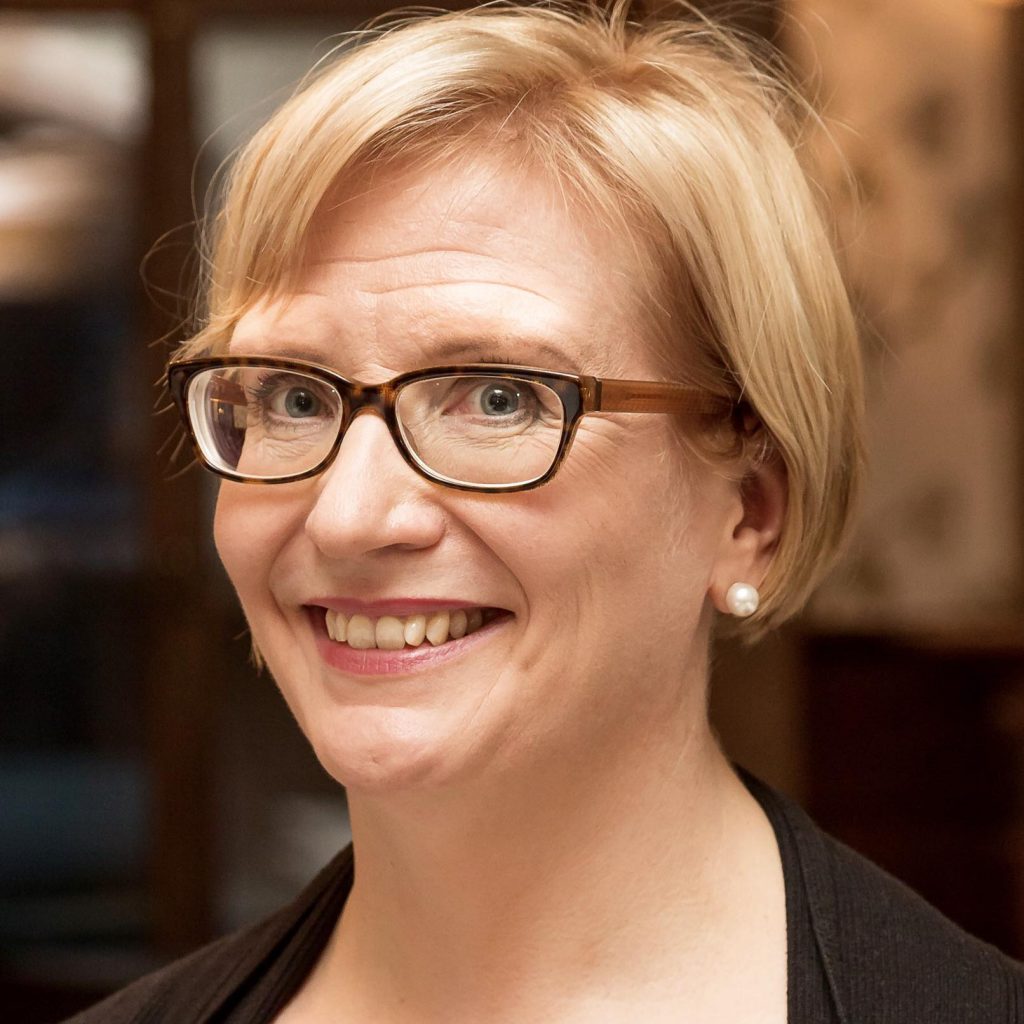
Can a Citizens’ Jury serve as a trusted source of voter information in the context of a government-initiated (top-down) referendum? Several studies show that Citizens’ Initiative Review (CIR) enhances voters’ knowledge and capacity of judgement in a ballot initiative processes. However, similar procedures have not been tested outside the U.S. or in the context of top-down government-initiated referendums. Maija Setälä and her colleagues studied a Citizens’ Jury on Referendum Options organized in the municipality of Korsholm in Finland in 2019. Even though the referendum concerned a contested municipal merger, they found that the Jury participants were nonetheless satisfied with the deliberative process and found it impartial. Furthermore; a large majority of voters had read the statement and thought it was a useful and trustworthy source of information. They also found that reading the statement increased trust in the jury, factual knowledge, issue efficacy and perspective-taking.
Results from the Deliberative Poll on the Icelandic Constitution
Participation in discussion, a chance to study the issues and ask experts about them influences participants views on the the Icelandic Constitution and amendments to it. The changes are in some cases quite substantial.
This can be seen from the results of a Deliberative Poll, conducted by the Social Science Research Institute at the University of Iceland, in collaboration with the Center for Deliberative Democracy at Stanford University and this research project: Democratic Constitutional Design in 2019.
The Deliberative Poll began with a general survey last summer, where a relatively large sample was asked about views on several issues in the Icelandic constitution that the government wants to revise during this term. Participants in the survey were invited to join a deliberative meeting on the same issues which took place in Reykjavík last November. 233 people participated in the meeting – about 10% of those who answered the survey questionnaire.
The deliberative meeting was held 9-10 November 2019. 27 groups discussed the following issues: The Icelandic presidency, national referendums, the Parliament’s power to indict ministers and the court of impeachment, articles on how the constitution can be changed. Participants were asked to answer a questionnaire on they views to proposals about changed and new articles of the constitution. They were also asked about their values and their political environment and political participation.
In some areas no significant changes were seen before and after the deliberative meeting. Views on the Icelandic presidency e.g. did not change much. In other areas significant changes were detected, such as participant views about what the constitution should say about the status of international agreements, about the Parliament’s power to indict ministers and the Court of Impeachment.
Further material and detailed reports on the results the Deliberative Poll are accessible here and a pdf of the presentation is available for download here.
